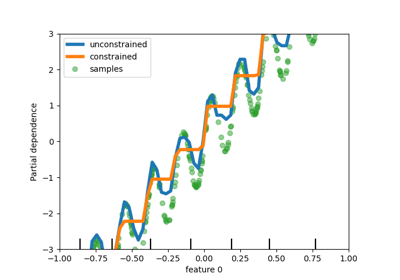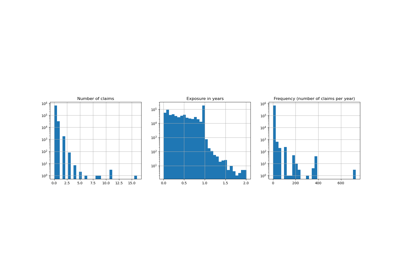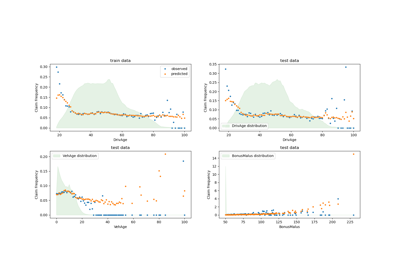PoissonRegressor#
- class sklearn.linear_model.PoissonRegressor(*, alpha=1.0, fit_intercept=True, solver='lbfgs', max_iter=100, tol=0.0001, warm_start=False, verbose=0)[source]#
Generalized Linear Model with a Poisson distribution.
This regressor uses the ‘log’ link function.
Read more in the User Guide.
Added in version 0.23.
- Parameters:
- alphafloat, default=1
Constant that multiplies the L2 penalty term and determines the regularization strength.
alpha = 0is equivalent to unpenalized GLMs. In this case, the design matrixXmust have full column rank (no collinearities). Values ofalphamust be in the range[0.0, inf).- fit_interceptbool, default=True
Specifies if a constant (a.k.a. bias or intercept) should be added to the linear predictor (
X @ coef + intercept).- solver{‘lbfgs’, ‘newton-cholesky’}, default=’lbfgs’
Algorithm to use in the optimization problem:
- ‘lbfgs’
Calls scipy’s L-BFGS-B optimizer.
- ‘newton-cholesky’
Uses Newton-Raphson steps (in arbitrary precision arithmetic equivalent to iterated reweighted least squares) with an inner Cholesky based solver. This solver is a good choice for
n_samples>>n_features, especially with one-hot encoded categorical features with rare categories. Be aware that the memory usage of this solver has a quadratic dependency onn_featuresbecause it explicitly computes the Hessian matrix.Added in version 1.2.
- max_iterint, default=100
The maximal number of iterations for the solver. Values must be in the range
[1, inf).- tolfloat, default=1e-4
Stopping criterion. For the lbfgs solver, the iteration will stop when
max{|g_j|, j = 1, ..., d} <= tolwhereg_jis the j-th component of the gradient (derivative) of the objective function. Values must be in the range(0.0, inf).- warm_startbool, default=False
If set to
True, reuse the solution of the previous call tofitas initialization forcoef_andintercept_.- verboseint, default=0
For the lbfgs solver set verbose to any positive number for verbosity. Values must be in the range
[0, inf).
- Attributes:
- coef_array of shape (n_features,)
Estimated coefficients for the linear predictor (
X @ coef_ + intercept_) in the GLM.- intercept_float
Intercept (a.k.a. bias) added to linear predictor.
- n_features_in_int
Number of features seen during fit.
Added in version 0.24.
- feature_names_in_ndarray of shape (
n_features_in_,) Names of features seen during fit. Defined only when
Xhas feature names that are all strings.Added in version 1.0.
- n_iter_int
Actual number of iterations used in the solver.
See also
TweedieRegressorGeneralized Linear Model with a Tweedie distribution.
Examples
>>> from sklearn import linear_model >>> clf = linear_model.PoissonRegressor() >>> X = [[1, 2], [2, 3], [3, 4], [4, 3]] >>> y = [12, 17, 22, 21] >>> clf.fit(X, y) PoissonRegressor() >>> clf.score(X, y) 0.990... >>> clf.coef_ array([0.121..., 0.158...]) >>> clf.intercept_ 2.088... >>> clf.predict([[1, 1], [3, 4]]) array([10.676..., 21.875...])
- fit(X, y, sample_weight=None)[source]#
Fit a Generalized Linear Model.
- Parameters:
- X{array-like, sparse matrix} of shape (n_samples, n_features)
Training data.
- yarray-like of shape (n_samples,)
Target values.
- sample_weightarray-like of shape (n_samples,), default=None
Sample weights.
- Returns:
- selfobject
Fitted model.
- get_metadata_routing()[source]#
Get metadata routing of this object.
Please check User Guide on how the routing mechanism works.
- Returns:
- routingMetadataRequest
A
MetadataRequestencapsulating routing information.
- get_params(deep=True)[source]#
Get parameters for this estimator.
- Parameters:
- deepbool, default=True
If True, will return the parameters for this estimator and contained subobjects that are estimators.
- Returns:
- paramsdict
Parameter names mapped to their values.
- predict(X)[source]#
Predict using GLM with feature matrix X.
- Parameters:
- X{array-like, sparse matrix} of shape (n_samples, n_features)
Samples.
- Returns:
- y_predarray of shape (n_samples,)
Returns predicted values.
- score(X, y, sample_weight=None)[source]#
Compute D^2, the percentage of deviance explained.
D^2 is a generalization of the coefficient of determination R^2. R^2 uses squared error and D^2 uses the deviance of this GLM, see the User Guide.
D^2 is defined as \(D^2 = 1-\frac{D(y_{true},y_{pred})}{D_{null}}\), \(D_{null}\) is the null deviance, i.e. the deviance of a model with intercept alone, which corresponds to \(y_{pred} = \bar{y}\). The mean \(\bar{y}\) is averaged by sample_weight. Best possible score is 1.0 and it can be negative (because the model can be arbitrarily worse).
- Parameters:
- X{array-like, sparse matrix} of shape (n_samples, n_features)
Test samples.
- yarray-like of shape (n_samples,)
True values of target.
- sample_weightarray-like of shape (n_samples,), default=None
Sample weights.
- Returns:
- scorefloat
D^2 of self.predict(X) w.r.t. y.
- set_fit_request(*, sample_weight: bool | None | str = '$UNCHANGED$') PoissonRegressor[source]#
Request metadata passed to the
fitmethod.Note that this method is only relevant if
enable_metadata_routing=True(seesklearn.set_config). Please see User Guide on how the routing mechanism works.The options for each parameter are:
True: metadata is requested, and passed tofitif provided. The request is ignored if metadata is not provided.False: metadata is not requested and the meta-estimator will not pass it tofit.None: metadata is not requested, and the meta-estimator will raise an error if the user provides it.str: metadata should be passed to the meta-estimator with this given alias instead of the original name.
The default (
sklearn.utils.metadata_routing.UNCHANGED) retains the existing request. This allows you to change the request for some parameters and not others.Added in version 1.3.
Note
This method is only relevant if this estimator is used as a sub-estimator of a meta-estimator, e.g. used inside a
Pipeline. Otherwise it has no effect.- Parameters:
- sample_weightstr, True, False, or None, default=sklearn.utils.metadata_routing.UNCHANGED
Metadata routing for
sample_weightparameter infit.
- Returns:
- selfobject
The updated object.
- set_params(**params)[source]#
Set the parameters of this estimator.
The method works on simple estimators as well as on nested objects (such as
Pipeline). The latter have parameters of the form<component>__<parameter>so that it’s possible to update each component of a nested object.- Parameters:
- **paramsdict
Estimator parameters.
- Returns:
- selfestimator instance
Estimator instance.
- set_score_request(*, sample_weight: bool | None | str = '$UNCHANGED$') PoissonRegressor[source]#
Request metadata passed to the
scoremethod.Note that this method is only relevant if
enable_metadata_routing=True(seesklearn.set_config). Please see User Guide on how the routing mechanism works.The options for each parameter are:
True: metadata is requested, and passed toscoreif provided. The request is ignored if metadata is not provided.False: metadata is not requested and the meta-estimator will not pass it toscore.None: metadata is not requested, and the meta-estimator will raise an error if the user provides it.str: metadata should be passed to the meta-estimator with this given alias instead of the original name.
The default (
sklearn.utils.metadata_routing.UNCHANGED) retains the existing request. This allows you to change the request for some parameters and not others.Added in version 1.3.
Note
This method is only relevant if this estimator is used as a sub-estimator of a meta-estimator, e.g. used inside a
Pipeline. Otherwise it has no effect.- Parameters:
- sample_weightstr, True, False, or None, default=sklearn.utils.metadata_routing.UNCHANGED
Metadata routing for
sample_weightparameter inscore.
- Returns:
- selfobject
The updated object.



